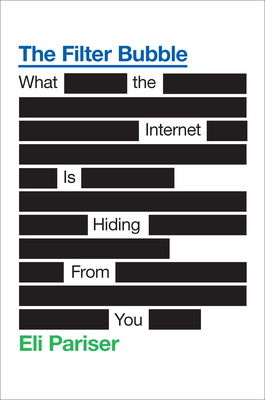We live in an information age with nearly everything available at our fingertips, but are we no longer being exposed to contrary opinions? Eli Pariser, in his book The Filter Bubble, considers whether personalization and filters on the internet are having an unfortunate effect upon us as individuals and citizens. Pariser, a former Executive Director of MoveOn.org, argues that the Internet is on the path to providing us with opinions from only those who think exactly the same as we do.
Try searching a term on Google and then have a friend search the same term and you may see that Google is providing different results for each of you. This is because Google uses many factors, from cookies to click history, to determine which results are most relevant to an individual. While personalization is clearly useful (e.g., when searching movies you probably want to see what's playing near you, first) Parserer feels that by only serving up information that we like, we might no longer be exposed to some information that is potentially good for us. To remain responsible citizens we need to be exposed to contrary opinions and in-depth analysis. From news to Netflix, there is a chance that the systems are overfiltering what we are seeing, and only coming up with very narrow matches. We are potentially missing out on gray area information that is not a great personalized fit but which we may enjoy reading or seeing.
Facebook and Google are two of the major sites trying to determine what we "like" to see vs. what we "need" to see and one of Pariser's problems with these sites is that their method of filtering is not transparent. Google serves as an editor by providing certain results first while moving others farther back in the results list, and we often have no idea why. We have very little control over what we prefer that Google provides to us.
Another major concern that Pariser addresses is the fact that when we use free online products, information that is being captured about us is usually being sold. There are huge databases about us, our preferences and the people we interact with, and there are myriad ethical questions about how this information can and will be used down the line.
While part of this book meandered away from its main topic overall this was a breezy look at some issues that will affect us more and more as the Internet continues to integrate itself into our lives. The book reads like a long magazine article and is approachable by anyone interested in the current state of the Internet.
View Eli Pariser's TED talk on the filter bubble.
Check our catalog


Mr. Pariser appears to be following up speculations made notorious some years ago by Cass Sunstein. Neither Mr. Pariser nor Mr. Sunstein appears to support his speculations with anything more than personal impressions and anecdotes.
ReplyDeleteOn the other hand, Jesse Shapiro did some real research in "Ideological Segregation Online and Offline" (first article listed at http://faculty.chicagobooth.edu/jesse.shapiro/), where he found no serious difference between the "bubble" effect online and offline.
Thanks for the link! I agree that The Filter Bubble is certainly anecdotal in tone.
ReplyDelete